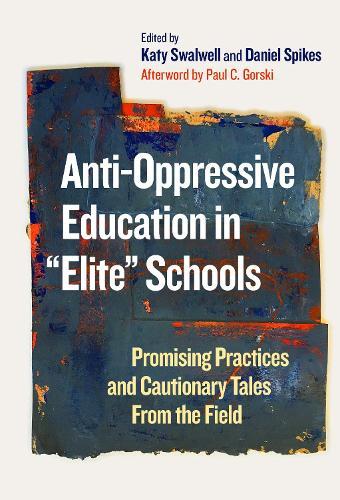|
Overview
Full Product Details
Author: Katy Swalwell , Daniel Spikes , Paul C. Gorski
Publisher: Teachers' College Press
Imprint: Teachers' College Press
Dimensions:
Width: 15.40cm
, Height: 1.70cm
, Length: 22.80cm
Weight: 0.370kg
ISBN: 9780807765890
ISBN 10: 0807765899
Pages: 264
Publication Date: 08 October 2021
Audience:
Professional and scholarly
,
Professional & Vocational
Format: Paperback
Publisher's Status: Active
Availability: In Print 
This item will be ordered in for you from one of our suppliers. Upon receipt, we will promptly dispatch it out to you. For in store availability, please contact us.
Table of Contents
Contents Acknowledgments xi Introduction: One Way to Make Change? 1 Katy Swalwell PART I: WHAT’S THE POINT? JUSTIFYING AND FRAMING ANTI-OPPRESSIVE EDUCATION IN “ELITE” SCHOOLS 13 1. Combating the Pathology of Class Privilege: A Critical Education for the Elites 15 Quentin Wheeler-Bell 2. Intrinsic Aspects of Class Privilege 27 Adam Howard 3. Is Becoming an Oppressor Ever a Privilege? “Elite” Schools and Social Justice as Mutual Aid 39 Nicolas Tanchuk, Tomas Rocha, and Marc Kruse PART II: CAUTIONARY TALES: PROBLEMATIC MODELS OF SOCIAL JUSTICE EDUCATION IN “ELITE” SCHOOLS 51 4. Beyond Wokeness: How White Educators Can Work Toward Dismantling Whiteness and White Supremacy in Suburban Schools 53 Gabriel Rodriguez 5. Dead Ends and Paths Forward: White Teachers Committed to Anti-Racist Teaching in White Spaces 63 Petra Lange and Callie Kane 6. Unspoken Rules, White Communication Styles, and White Blinders: Why “Elite” Independent Schools Can’t Retain Black and Brown Faculty 73 Ayo Magwood 7. Critical Service Learning: Moving from Transactional Experiences of Service Toward a Social Justice Praxis 85 Tania D. Mitchell 8. The “Duality of Life” in “Elite” Sustainability Education: Tensions, Pitfalls, and Possibilities 97 Kristin Sinclair, Ashley Akerberg, and Brady Wheatley 9. The Possibility of Critical Language Awareness Through Volunteer English Teaching Abroad 109 Cori Jakubiak PART III: PROMISING PRACTICES? IDEAS FOR ENACTING ANTI-OPPRESSIVE EDUCATION IN “ELITE” SCHOOLS 121 10. Living Up to Our Legacy: One School’s Effort to Build Momentum, Capacity, and Commitment to Social Justice 123 Christiane M. Connors, Steven Lee, Stacy Smith, and Damian R. Jones 11. Facilitating Socially Just Discussions in Elite Schools 135 Lisa Sibbett 12. Mobilizing Privileged Youth and Teachers for Justice-Oriented Work in Science and Education 147 Alexa Schindel, Brandon Grossman, and Sara Tolbert 13. Opening the Proverbial Can O’ Worms: Teaching Social Justice to Educated Elites in Suburban Detroit 159 Robin Moten 14. Intersectional Feminist and Political Education with Privileged Girls 169 Beth Cooper Benjamin, Amira Proweller, Beth Catlett, Andrea Jacobs, and Sonya Crabtree-Nelson 15. “Not Me!” Anticipating, Preventing, and Working with Pushback to Social Justice Education 181 Diane Goodman and Rebecca Drago PART IV: CONVERSATIONS WITH COLLEAGUES 193 16. Out of This Chaos, Beauty Comes: Democratic Schooling in a Progressive Independent Middle School 195 Allen Cross 17. We Are Afraid They Won’t Feel Bad: Using Simulations to Teach for Social Justice at the Elementary Level 201 Gabby Arca and Nina Sethi 18. Harnessing the Curiosity of Rich People’s Children: International Travel as a Tool of Anti-Oppressive Education 207 Alethea Tyner Paradis 19. Building a Class: The Role of Admissions in Anti-Oppressive Education 213 Sherry Smith 20. “It Shouldn’t Be that Hard”: Student Activists’ Frustrations and Demands 219 Julia Chen, Haley Hamilton, Vidya Iyer, Alfreda Jarue, Catalina Samaniego, Catreena Wang, and Jenna Woodsmall Afterword 229 Paul Gorski About the Editors and Contributors 235 Index 243
Reviews
Author Information
Katy Swalwell is a former classroom teacher and professor who currently serves as lead equity specialist with the Equity Literacy Institute. Daniel Spikes is an academic and K-12 educator. Together, they cofacilitate sustained professional development nationwide on critical consciousness and the instructional, curricular, and systemic changes needed to work toward equity and justice in education.
Tab Content 6
Author Website:
Countries Available
All regions
|



